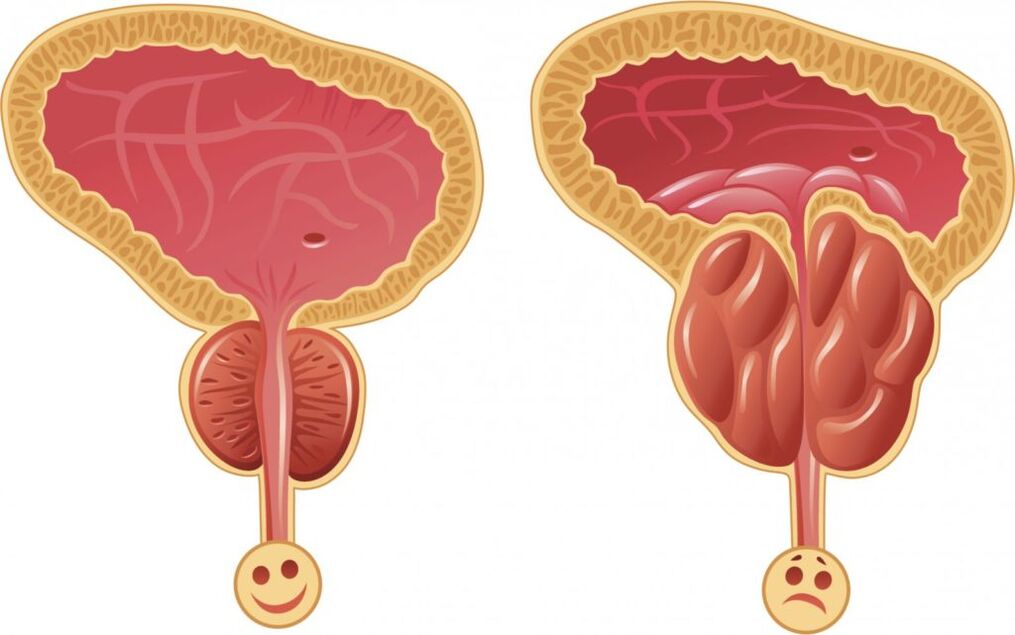About one-third of men of active reproductive age -- between the ages of 20 and 40 -- have chronic prostatitis. The quality of life of many patients is significantly reduced due to this disease. Chronic prostatitis is difficult to treat, but it can improve long-term health, restore impaired function, and eliminate painful symptoms. The most important thing is to choose the right treatment plan. Of course, that's the doctor's job, but in any case, it's useful to know which drugs are available for treatment. Let's talk about what medications exist to treat prostatitis and how they work.
Prostatitis drug group
Any disease—prostatitis is no exception—has a developmental mechanism of etiology, pathological process, and clinical manifestations. Accordingly, the direction of treatment is also different.

A question may arise: why not limit yourself to symptomatic treatment, because after eliminating the cause, the development of the disease should stop and the symptoms disappear? Not everything is so simple for chronic diseases, including prostatitis. First, the cause cannot always be found and eliminated. Second, when the pathological mechanism is already operating, it is self-sufficient, and even eliminating the cause does not guarantee a cure. Therefore, a universal prostatitis treatment has not yet been developed: today, all aspects of treatment are important.
anisotropic drugs
The etiology of chronic prostatitis is unknown. On the one hand, infection is believed to be responsible for the development of inflammatory processes. No microbes were found in healthy prostate tissue. On the other hand, bacterial prostatitis only accounts for about 10% of the overall structure of the disease, and the remaining 90% of cases are non-bacterial forms. It is possible that infection acts only in the early stages of disease development and is a trigger for the pathological process of the prostate. In the future, the importance of the microbial flora will decrease, and the pathological changes of prostate tissue (congestion, impaired microcirculation, autoimmune mechanisms, etc. ) will become more important factors. What drugs are used to treat prostatitis?
Equivariant treatment of bacterial prostatitis involves the use of antibiotics. With their options, not everything is as simple as it seems. First, the range of microorganisms is changing: if until recently Escherichia coli was the causative agent of chronic prostatitis, Chlamydia, Mycoplasma, Ureaplasma, Gardnerella and Trichomonas are now increasingly found. They are not sensitive to previously used antibiotics. Second, the resistance of microorganisms to the action of antimicrobial agents is increasing. Therefore, anisotropic drugs for the treatment of prostatitis should be prescribed only after the type of pathogen and its susceptibility to antibiotics have been determined.
Consider antibacterials effective for prostatitisFluoroquinolones. They penetrate well into the prostate tissue where they form high enough concentrations to destroy microbes. Another advantage of fluoroquinolones is their broad range of action: many types of pathogenic bacteria are susceptible to them. This group of drugs for prostatitis includes active substances such as ciprofloxacin, levofloxacin, and lomefloxacin.
When chlamydia and other intracellular microorganisms are detected,Macrolidesandtetracycline. They are active against specific flora, but have adverse effects on the typical pathogens of chronic prostatitis - Escherichia coli, Staphylococcus. The advantage of macrolides is their low toxicity.
Pathogen therapeutic agent
In the context of chronic inflammation of prostate tissue, a series of changes occur. Secretion is stagnant, venous outflow deteriorates, the nutrition of the glands is disturbed, fibrosis gradually develops (replacement of healthy connective tissue), immunity is impaired. These interconnected pathological changes support inflammatory processes and reduce the effectiveness of disease-causing treatments. Restoring the structure and function of the glands with the help of pathogen therapy helps to break the vicious cycle. Because the pathogenesis of chronic prostatitis involves many factors, there are many kinds of drugs in this group.
- immunomodulator. During chronic inflammation, the work of all parts of the immune system is disrupted. Immunomodulators modulate defense mechanisms and help respond to inflammation and infection. This is a large class of drugs with different mechanisms of action.
- Antioxidants. One of the pathological mechanisms that accompany inflammation is oxidative stress. Prostate cells are damaged by free radicals, which are formed due to a dramatic increase in the content of white blood cells in prostate secretions. Oxidative stress exacerbates and sustains the inflammatory response. To stop this process, antioxidants are prescribed for chronic prostatitis: zinc, selenium, copper preparations, vitamins A, C, E, folic acid, L-carnitine, glutathione, resveratrol, etc.
- Enzyme. Healthy glandular tissue is replaced by connective tissue due to chronic inflammation, oxidative stress, and insufficient blood supply. Enzyme preparations (mainly based on hyaluronidase) slow the progression of fibrosis.
notes
Among the drugs for the treatment of prostatitis, peptide biomodulators extracted from animal prostate deserve special attention. They have a selective effect on the prostate, in particular improving blood flow and restoring microcirculation. As a result, swelling is reduced, the risk of blood clots is reduced, pain subsides, urination is normal, and prostate function returns. In some cases, prostatitis can be prevented with these drugs.
symptomatic drugs
One of the main goals of the treatment of chronic prostatitis is to spare the patient the painful manifestations of the disease. Symptomatic drugs do not affect the course of the inflammatory process, but can relieve the patient's condition. So, how does it help prostatitis?
- alpha blockerBlocks nerve impulses from receptors in the smooth muscle of the prostate, urethra, and bladder. As a result, the cramps stopped, the pain disappeared, and urination was normal. This action does not happen immediately, but occurs two weeks after the start of treatment.
- antispasmodicUsed for the same purpose as alpha-blockers. They help relax smooth muscles. As the spasms are eliminated, the pain is relieved and the flow of urine is restored.
- NSAIDsUsed to relieve pain and reduce inflammation. These drugs work quickly, but they cannot be used long-term due to the risk of side effects.
Medications in the form of suppositories help restore the function of the prostate, help relieve pain and improve the process of urination.
How to choose a drug for prostatitis
According to the diagnosis and analysis of the patient's complaint, the urologist chooses the treatment plan and drugs for the treatment of prostatitis. Treatment of this disease should be comprehensive: this is the only way to achieve stable and long-lasting results. If the test shows an infection, the doctor will definitely prescribe antibiotics based on the type of pathogen. In other cases, pathogenic and symptomatic treatments are used. The latter was chosen based on prevalent complaints. For example, if the patient is concerned about pain, NSAIDs are prescribed. For urination problems, alpha-blockers are used.
Drugs used for prostatitis differ not only in the composition and mechanism of therapeutic action, but also in the form of release. There are mainly tablets, capsules and rectal suppositories. Drugs in injectable form are used less frequently.

Tablets and capsules are convenient to take. First, however, suppositories act faster: through the wall of the rectum, which is in contact with the prostate, the active substance is transported immediately to the site of inflammation via the lymphatic route. Second, drugs in the form of suppositories have a higher bioavailability: unlike tablets, they are not metabolized in the liver and the concentration of the active ingredient is not reduced. Finally, suppositories are safer in terms of side effects: in particular they have few negative effects on the gastrointestinal tract.
In the modern treatment regimen of chronic prostatitis, attention is paid to all components of treatment: etiology, pathogenicity, and symptoms. Medications should be chosen by the physician, focusing on the test results and the patient's chief complaint. A comprehensive approach to treatment and the right choice of drugs can help restore impaired function and forget the symptoms of prostatitis for a long time.
Prostatitis Suppository
One of the medications that urologists often prescribe to treat chronic prostatitis is in the form of suppositories. This tool has been used in clinical practice for over 30 years.
The active ingredient of the suppository is bovine prostate extract. It contains peptide complexes that have a modulating effect on prostate cells. This medicine helps improve microcirculation and venous outflow, thereby reducing inflammation and swelling, and reducing pain.
Indications for use - chronic non-bacterial prostatitis, conditions before and after prostate surgery, benign prostatic hyperplasia.
Suppositories are highly bioavailable. Low molecular weight peptides readily penetrate biological barriers and are delivered to the focal point of inflammation. Highly purified minimizes the risk of allergies and other adverse reactions.
Suppositories containing bovine prostate extract are compatible with antibiotics and other drugs used in the comprehensive treatment of chronic prostatitis. Means are applied through short courses (from 10 days). However, it is affordable.






























